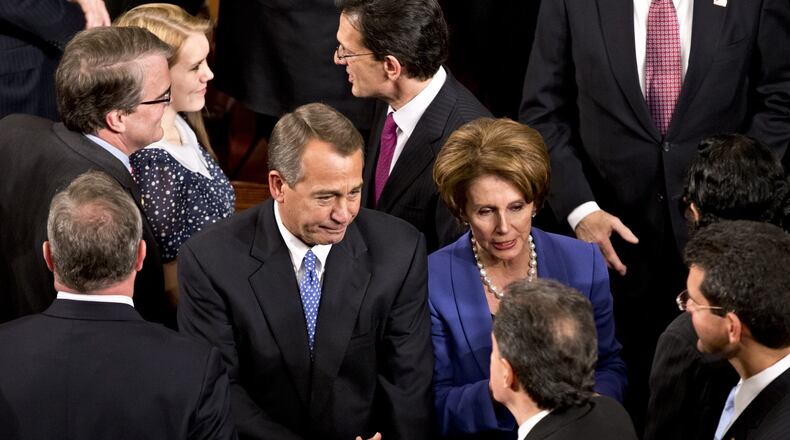Unmatched political coverage
We have two reporters working full-time in Washington to bring you the latest news you need on politics, government spending and military affairs. Follow us on Twitter at @Ohio_Politics
Newly re-elected House Speaker John Boehner yesterday warned his colleagues that the American dream “is in peril’’ as long as the federal government is “weighed down by this anchor’’ of trillions of dollars of debt and projected annual deficits during the next decade.
Just moments after 220 House Republicans gave the West Chester Twp. lawmaker his second term as speaker, Boehner vowed a new assault on restraining federal spending, saying there was a link between heavy government debt and a weak economy.
“Our government has built up too much debt,” Boehner said. “Our economy is not producing enough jobs. These are not separate problems … At $16 trillion and rising, our national debt is draining free enterprise and weakening the ship of state.”
Starting Thursday, Boehner’s 8th congressional district includes Clark, Butler, Miami, Preble and Darke counties and part of Mercer County.
Boehner was narrowly re-elected to the top post despite nine GOP defections. The nine voted for a disparate group of candidates that included House Majority Leader Eric Cantor, former U.S. Rep. Allen West of Florida, Rep. Raul Labrador of Idaho, U.S. Rep. Justin Amash of Michigan, former Government Accountability Office comptroller David Walker and U.S. Rep. Jim Jordan, R-Urbana.
Jordan, who was in the crowd, shook his head “no” when Rep. Tim Huelskamp, R-Kan., voted for him. Jordan later voted for Boehner for speaker, as did Cantor.
House Minority Leader Nancy Pelosi, D-Calif., also saw defections, with Democrats voting for retired Gen. Colin Powell and Rep. John Lewis, D-Ga., among others.
Boehner was re-elected after what has been by all accounts a difficult few weeks. He was criticized by House conservatives after stripping a handful of Republican lawmakers of their committee assignments, and his attempt to pass a “Plan B” aimed at averting the fiscal cliff failed to draw support from his own caucus. Ultimately, the compromise aimed at averting the fiscal cliff came down to Vice President Joe Biden and Senate Minority Leader Mitch McConnell.
The last 48 hours have also been difficult: After the House passed the fiscal cliff bill on Tuesday, Boehner recessed the House without voting on disaster aid for victims of Hurricane Sandy. That decision drew the loud criticism from Republicans from New York and New Jersey, with Rep. Peter King, R-N.Y., saying the decision was a “cruel knife in the back.”
New Jersey Gov. Chris Christie, meanwhile, praised Cantor but was critical of Boehner, saying Boehner ignored four calls from Christie Tuesday night.
“Unfortunately people are putting politics ahead of their responsibilities,” he said.
Boehner later released a statement saying he planned to vote on Sandy relief Jan. 15 and that “getting critical aid to the victims of Hurricane Sandy should be the first priority in the new Congress.”
But yesterday, at least, the tone was a little more genteel, with lawmakers from both parties standing to applaud Boehner and Pelosi when they were nominated.
Still, Boehner seemed to allude to his past few weeks during his speech.
“Public service,” he said, “was never meant to be an easy living.”
Ohio delegation smallest since 1830s
There are 16 members of the Ohio delegation in the new Congress — the fewest since the 1830s. The state has been losing members in recent decades since the population is not growing as fast as other states. At its peak in the 1970s, Ohio had 24 members in the House.
For the first time in Ohio history, there are two black members of the state delegation, including Rep. Marcia Fudge, D-Cleveland, who was recently tapped to head the Congressional Black Caucus. In November, Joyce Beatty, a former Ohio State University administrator and state representative, won in the new 3rd Congressional District representing the Columbus area.
Boehner will lead a House that has a Republican majority of 233-200, with two vacancies, a loss of eight seats for the GOP.
Democrats hold a 55-45 majority in the Senate, and control two more seats than they did the past two years.
Across the Capitol on Thursday, children and grandchildren squirmed through opening formalities that ended with Boehner’s election as the most powerful Republican in a government where President Barack Obama will soon be sworn in to a second term and his fellow Democrats control the Senate.
Like Boehner, Senate Majority Leader Harry Reid, D-Nev., said he, too, is ready for attempts to rein in federal spending, but laid down a few conditions. “Any future budget agreements must balance the need for thoughtful spending reductions with revenue from the wealthiest among us and closing wasteful tax loopholes,” he said. That was in keeping with Obama’s remarks after Congress had agreed on fiscal cliff legislation to raise taxes for the wealthy while keeping them level for the middle class.
Boehner and McConnell have other ideas, both having said in recent days that the days of raising taxes are over.
“Now is the time to get serious about spending,” McConnell said. “And if the past few weeks have taught us anything, that means the president needs to show up early this time.” People won’t “tolerate the kind of last-minute crises that we’ve seen again and again over the past four years as a result of this president’s chronic inactivity and refusal to lead on the pressing issues of the day.”
While neither Boehner nor Reid mentioned immigration in their opening-day speeches, Obama is expected to highlight the issue in the first State of the Union address of his new term. Obama will be sworn in for a second term on Jan. 20.
The Associated Press contributed to this report.
About the Author
